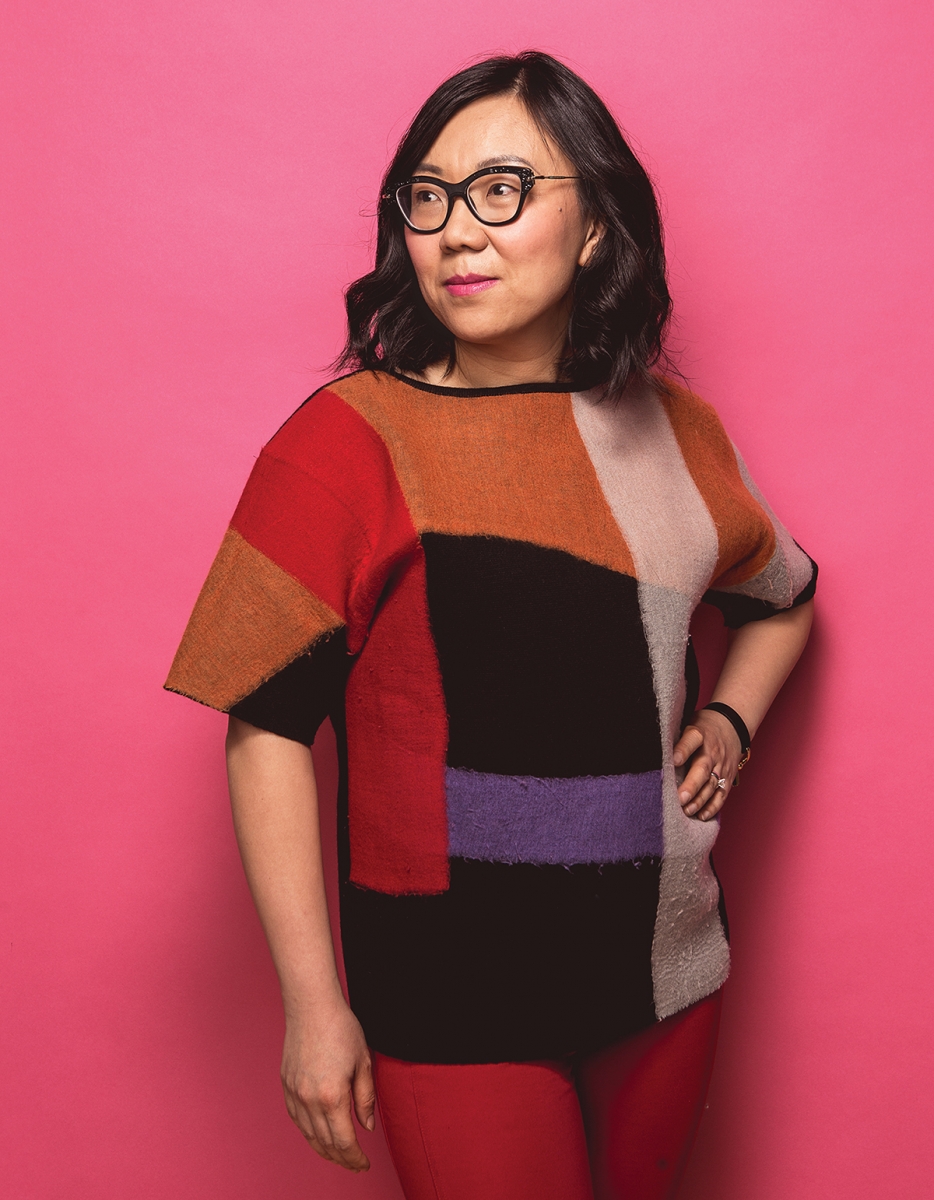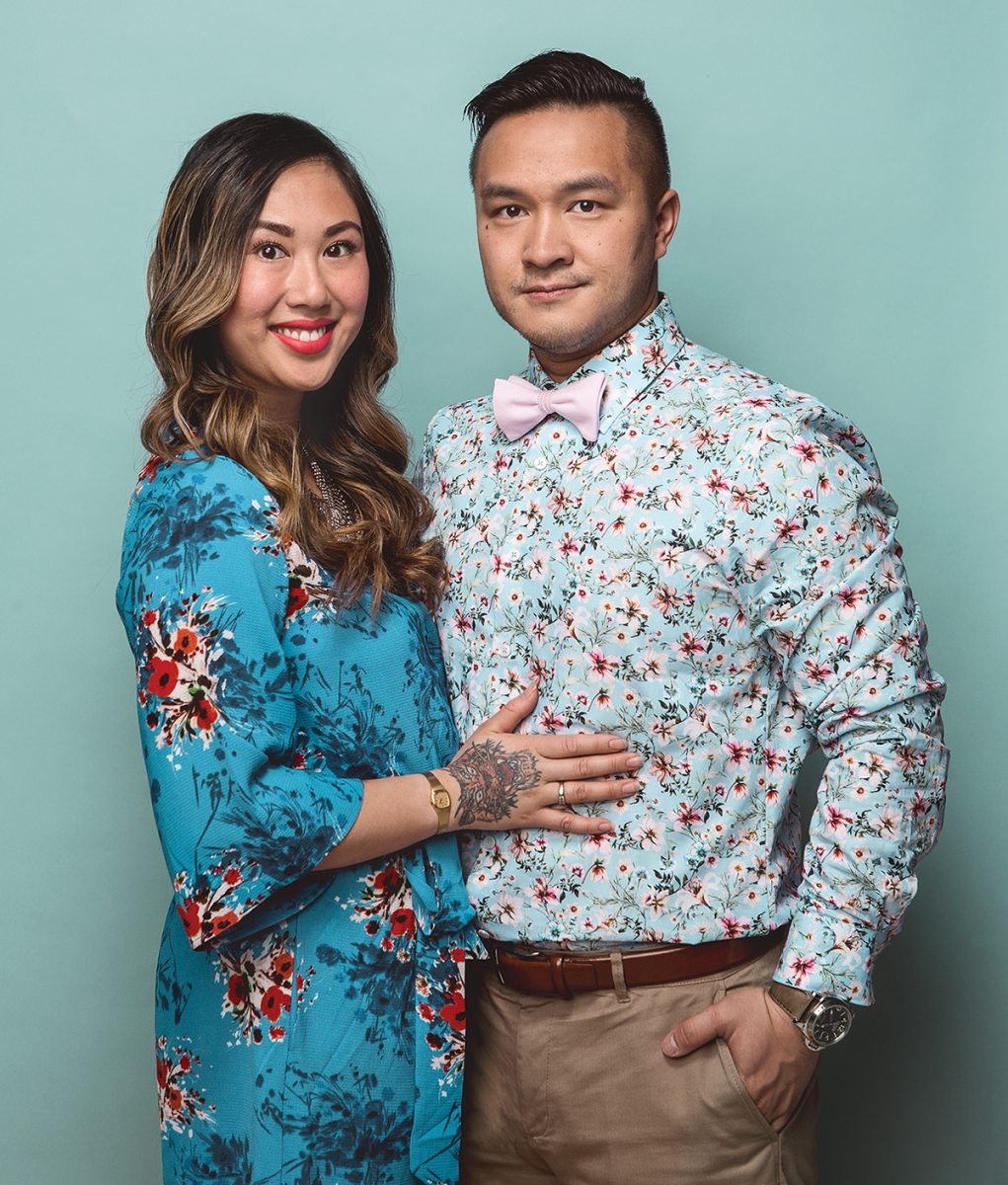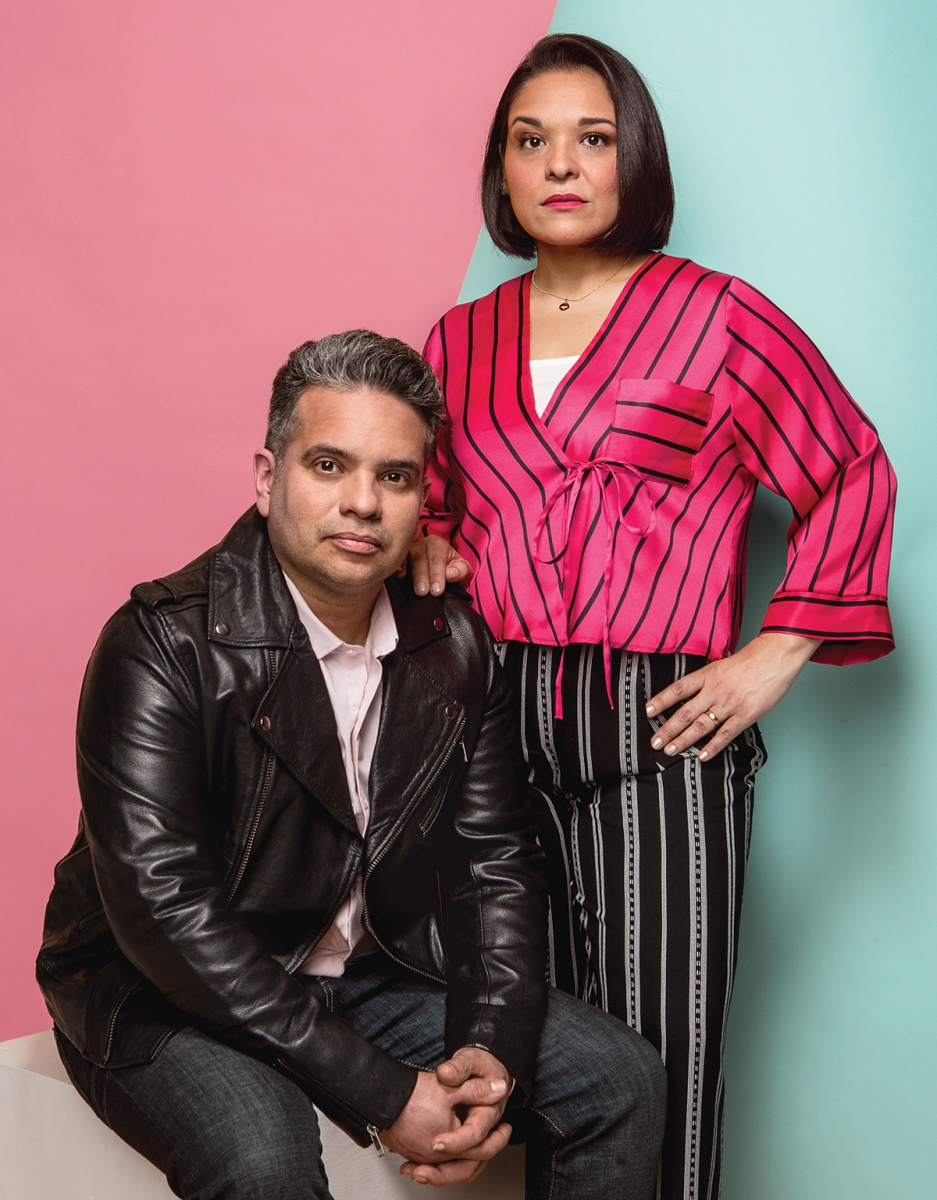
Rolando Sandrea is blacklisted in Venezuela. He voted against then-president Hugo Chavez in the 2004 recall referendum and was suddenly fired from his job as a chemical engineer. “They say votes are free and confidential, but they are not,” Rolando says. “The main industry back home is oil, so to be blacklisted meant you were banned from any government-related business,” his wife, Samantha, adds. “The government had almost total control, they took over many private businesses and seized properties.”
That was when the Sandreas decided to move to Canada. Samantha had studied in Quebec for one year as an exchange student after high school and wanted to return one day – but didn’t realize it would be under such dire circumstances with a husband and daughter in tow.
“I was pregnant and I thought, I don’t want to raise my kid here,” Samantha says. But instead of Eastern Canada, the Sandreas moved to Lloydminster, where the oil industry promised more job opportunities for Rolando. Samantha took on a newly created role as the head of Catholic Social Services’ Newcomers Program, where she was able to help other immigrants like herself and meet people in the community.
The couple later moved to Edmonton but, when Rolando was laid off in 2015, he was discouraged by the prospect of starting and losing another job. Inspired by his love of cooking, he started thinking about opening his own restaurant. “The idea for a restaurant was always there, but with everyday life, you never take your plans seriously. So that was the moment when we said, let’s do it.”
As the couple started to develop their restaurant, they wanted the sole focus to be Venezuelan food made from scratch; arepas were made the eponymous stars of the menu. “We knew everything about arepas, we grew up with them,” Samantha says, noting that in Venezuela they’re
common daily meals, equivalent to sandwiches. “We wanted to create a casual arepa place similar to what’s back home.”

They knew they were taking a risk by introducing a relatively unknown food to Edmontonians. “Many friends told us it wasn’t going to work, they advised us not to make our business ‘too Venezuelan,'” Samantha laughs. “They told us to sell tacos or open a burger joint. We didn’t listen. It’s easy to criticize without knowing what you’re investing in. We didn’t want to do something that wasn’t us, but it is hard to stay true to yourself when you have all of these voices.”
So when the doors of Avila Arepa opened on June 23, 2017, they were pleasantly surprised when the crowds strolling Whyte Avenue began to filter into the restaurant. A year after opening, business is going well – plans for expansion are in the works – and they’ve been pleased with the reaction from diners. “Parents will come in and say, ‘we’ll try this, but our kid is really picky,’ and then to see [their children] enjoy it is a proud moment,” Samantha says. “Moments like that, we know we’re doing good. The secret is we don’t only love what we do, but we make everything from scratch. We try to make good food that’s affordable, and that’s key.”
For some customers, the food is a literal taste of home. “Some people come with a little bit of nostalgia and their memories of living or working or travelling in Venezuela,” Samantha says. “We have cases of people who were born [in Venezuela] , but have lived here for years, decades, and they no longer speak a word of Spanish, but they remember what arepas taste like,” Rolando says. “It’s a universal language of food. We have our way of doing things and communicating through food. People expect that same flavour that matches their memories, and we try to do that.”
Samantha last travelled to Venezuela in 2016 to visit family. “It was even worse than I imagined. I felt so bad because I know my family struggles to find things to eat, food is very scarce. Even if they had money there’s nothing to buy. I gave my cousin some money to buy food for dinner and they were so excited, excited for this feast, and there was barely anything. It’s ironic that we have a restaurant here. It’s bitter- sweet. We’re happy to share our culinary heritage, but we’re also very much aware of the situation going on back home. We hope it will change, and the restaurant is a reminder of how it used to be and hopefully how it will be.

“I wish we could visit because it’s beautiful, most of the people are nice with obvious exceptions. But even if things got better, and we should have a chance to go back, I would still live here. I love Canada.”
When Jingjing Zheng grew up in Shenyang in Northern China in the 1990s, the clothing brand, Bosideng, was ubiquitous with over 11,000 retailers in Asia and lucrative partnerships with brands like Nike. So years later, when the brand failed to expand into Europe, closing its e-commerce site and flagship store in London after less than five years, Zheng started thinking about what would become Bridges Creative, her public relations firm that helps Asian companies reach Western markets.
“Before I immigrated, a lot of Western brands started to enter China,” Zheng recalls. “I remember when the first KFC opened in my town, everybody was super excited. Today you can find almost any North American brand in China and a lot of Asian brands are coming into North America, but there aren’t a lot of marketers and brand strategists to help them. I see my role as someone who can connect the West and the East, there should be a more fluid cultural exchange. With Bosideng, they had quality products, but there was no brand recognition. People didn’t know what it was. They didn’t address that it was a totally different market with a totally different mentality.”
Zheng has been living in Edmonton since 2007 when she moved for graduate school from Ottawa, where she had immigrated for university. “I didn’t know anything about Edmonton. But I finished my schooling here, I met my husband here, now I have two daughters. I really fell in love with the city. I feel it’s a great place to raise a family. I joined Startup Edmonton, I like what they’re doing to diversify the economy with the tech sector. It just feels like a young city with a lot of potential.”
Since Bridges Creative started to take shape in 2015, Zheng’s worked with some investors and restaurants, but her biggest client has been Miniso, a Japanese store carrying novelties that Zheng likens to those well-designed, aesthetically pleasing knick knacks you find at IKEA. Relatively unknown beyond its 1800 locations in Asia, Zheng’s job has been to make sure Miniso doesn’t reach the same fate as Bosideng.
While Miniso has strong brand recognition with Asian immigrants, Zheng says it’s virtually unknown to non-Asian communities. ” [Alberta] is so diverse, so our goal is to make it appealing to everyone,” Zheng says. “Miniso wants to be in every little community, so people recognize it as a store they can get their everyday essentials at and have an enjoyable shopping experience for something that’s affordable. Rather than promoting Miniso as something exotic, we just want it to be part of the communities.” Miniso’s first Alberta store opened in the Edmonton suburb of Griesbach, followed by one in South Edmonton Common. Zheng says the brand has plans to open 30 stores across Alberta.
“Miniso has a strong brand and strong imagery, but they needed someone who knows the local environment to provide advice,” Zheng says. “There’s a global culture, a brand doesn’t have to just be Asian or European.” As his eponymous restaurant, Doan’s Vietnamese, celebrates its 30th anniversary this year, Doan Nguyen reflects on its humble beginnings. During some time off from his carpentry job following a workplace accident, Nguyen wanted to perfect his cooking skills and eventually started to develop his own recipes. With his passion for food decidedly more than a fleeting hobby, Nguyen decided to open a restaurant of his own.
Nguyen himself is celebrating a milestone this year – his 70th birthday. But every birthday is a meaningful one when he almost didn’t make it past age 28. Nguyen grew up in Vietnam and, in post-war 1976, knew that the Communist government limited his options. Thanks to the just-passed Immigration Act, Canada was open to immigrants and refugees but there wasn’t an easy way for Doan and his girlfriend – now wife – Cathy to get there. But the perceived freedom Canada offered Ngyuen was worth the risk, and he decided to use his fishing boat to escape with Cathy and 16 others. While at sea he often had to repair the boat’s mechanical failures and was refused asylum twice.
Doan’s daughter-in-law, Loan, notes that her mother had left Vietnam around the same time in similar circumstances. “They had to escape, it wasn’t easy to leave. But they had heard a lot of good things about Canada and the opportunity.”
Doan and Cathy eventually made it to a refugee camp in the Philippines, and, nine months later, arrived in Edmonton. They had no money and spoke no English, but Doan found work making cabinets, and Cathy as a seamstress.
But what Doan really wanted to do was to introduce traditional Vietnamese food to a mainstream audience; in 1988, at least in Alberta, pho was not the ubiquitous dish it is today. Doan opened Huong Que Noodle House in Chinatown, then sold it to open Doan’s Vietnamese Restaurant downtown, followed by a second location in Old Strathcona in 1996.
Doan and Cathy’s son, Jackson, now manages the restaurants with his wife, Loan. The goal of making Vietnamese food mainstream has been achieved, so standing out in a sea of spring rolls and pho is the challenge for them.
“As we move forward we want to make our food a little newer, refreshed, more modern,” Jackson says. “I’ve seen comments that have said our food ‘isn’t authentic,’ and I think – if I brought out a bowl of authentic spicy Vietnamese soup with a pig’s foot in it, would you eat it? Or rice congee with cold intestines and pig’s blood gelatine – most people wouldn’t eat it. But we love it. I think that’s one of the things we’d love to try, serving more adventurous foods.”
But there are some things Jackson and Loan will never change. Jackson credits Doan’s three decades of success to his parents’ work ethics and passion for food. “It’s been luck, hard work and strategy. When my parents opened the restaurant, there were other Vietnamese restaurants but they saw an opportunity to reach beyond the Vietnamese communities. They stayed open later than everyone else. My parents were at the restaurant all the time. Mom just has that immigrant mentality. She’s always going to be working. She works so hard.”
Cathy has made every single spring roll and wonton served at Doan’s since it opened, and continues to source local ingredients like beef balls made with a family recipe and AAA beef, and tofu made at Ying Fat in Chinatown. “We can’t go away from stuff like that, quality is our
philosophy,” Jackson says. “Ninety-nine per cent of the people aren’t going to notice, but we still do it. There’s that integrity, and that’s what my parents have wanted all this time.”
While Jackson and Loan have plans to add more locations, they will always stay true to what Doan and Cathy envisioned.
“We have roots here because of the business, but I love Edmonton and I see no reason to leave it,” Jackson says. “My parents love Edmonton, they’ve been here for so long and they’ve seen it grow. Edmonton welcomed them, it gave them a home and a future.”
This article appears in the June 2018 issue of Avenue Edmonton









